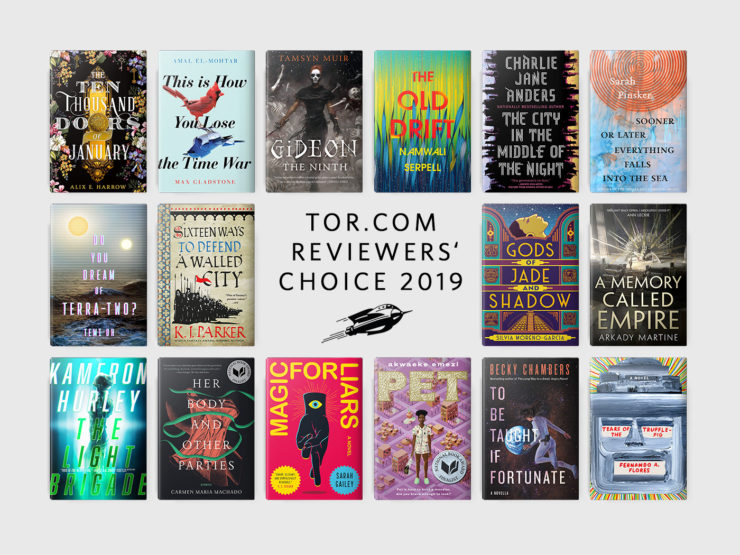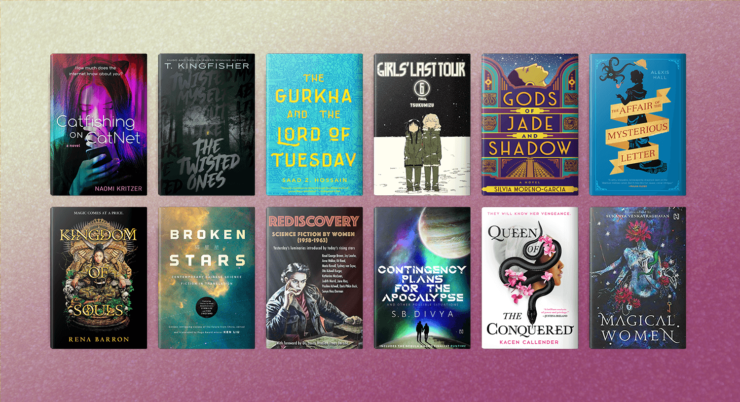2019 has been (and still is) an amazing year of book releases in the genres of science fiction, fantasy, young adult, and beyond. The following highlights from the book reviewers on Tor.com take place in tomorrows both near and far, and in time wars both personal and catastrophic. Necromancers clawed for our attention in imaginative new ways and the number 9 came up a lot. Space opera nearly ran the table!
Below, Tor.com’s regular book reviewers talk about notable titles they read in 2019.
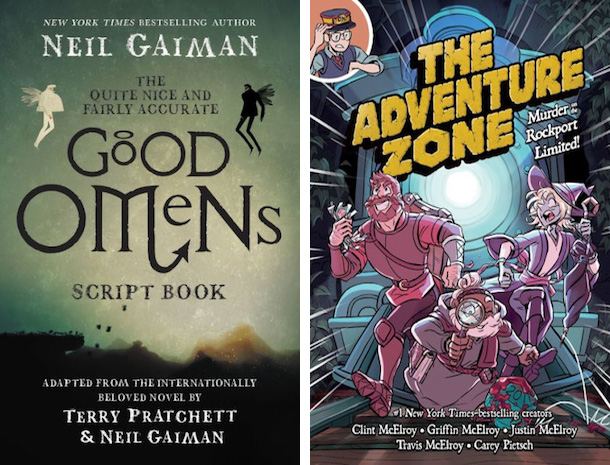
2019 was all about comfort food for me. I wanted goofs, kindness, and found family. Mostly, I wanted queer disasters with hearts of extremely tarnished gold, muddling their ways through a world of chaos and cynicism. Thank god it was the year of the Return of Good Omens—not just the TV series, but also The Quite Nice and Fairly Accurate Script Book, endless fanfiction, and the definitive illustrated edition of the novel itself. Gaiman and the fandom have truly made sure that Pratchett’s gifts keep on giving.
The Adventure Zone: Murder on the Rockport Limited hit that particular spot as well. These characters may be ungainly dorks with questionable moral compasses, but boy do they have heart. The McElroy family had a vision, and Carey Pietsch has helped them execute that vision with brilliance and panache. I could not ask for more.
—Em Nordling
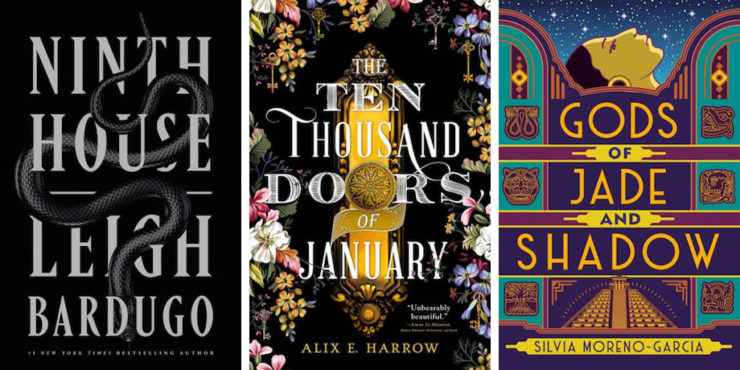
About halfway through Leigh Bardugo’s Ninth House I knew it was going to be the best book I read all year. Then I cracked open The Ten Thousand Doors of January by Alix E. Harrow and quickly realized that for the first time in a long time I was going to end up with a tie. Honestly, I simply can’t choose between them. They’re both very different novels in style and content, but they share the deeper themes of feminism, anti-colonialism, anti-capitalism, and anti-patriarchy. Ninth House is a vicious destruction of man-made cruelty, while The Ten Thousand Doors of January is an awakening to all the possibilities of life. Yet each cry out for the truth and demand the freedom to be oneself.
I also have to sing the praises of the wonderful Gods of Jade and Shadow by Silvia Moreno-Garcia. Set in 1920s Mexico, this dark, gorgeous fairytale is as smooth as polished jade and sharp as an obsidian blade. Casiopeia’s quest to find the stolen pieces of Hun-Kamé, a Mayan god of death, is literal and metaphorical. To save her life she must restore the Lord of Xilbalba to his throne, but she must also learn to find value in herself. I’ve admired Silvia’s short fiction for a while now, and although this was the first of her full-length work I’ve read, it certainly won’t be the last.
And of course I can’t forget shout outs to some utterly fantastic short speculative fiction. Maurice Broaddus tells the whole history of African migration (forced and willing) in his gut wrenching piece “The Migration Suite: A Study in C Sharp Minor“. Cassandra Khaw’s “Mighty Are the Meek and the Myriad” is a crisp, cold tale about the war between humans and robots. And last but not least, “And Now His Lordship Is Laughing” by Shiv Ramdas where a Bengali grandmother gets the revenge of a lifetime against her colonial oppressors.
—Alex Brown
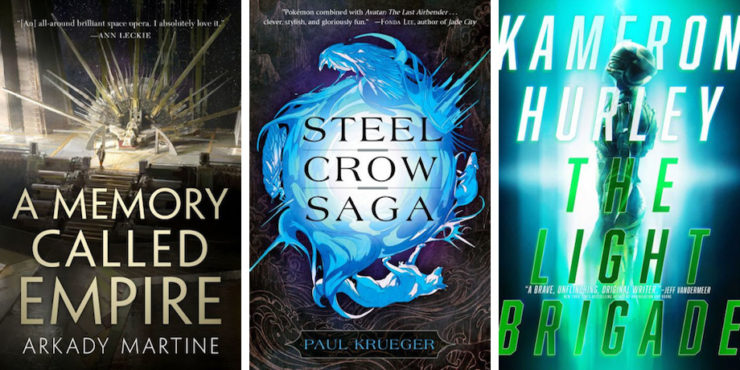
Picking three books in a year of time wars, necromancers, cities in the middle of nights, and wars of jade is herculean. Much love to the alluded above, and more love to those unmentioned; too many books, too little text. But we must pick, and so we shall.
A Memory Called Empire by Arkady Martine is my debut of the year; Mahit Dzmare, ambassador to a free society of space station dwellers, must navigate the Teixcalaanli Empire and find her predecessor’s murderer. Empire is fully formed upon the page, and Martine’s expert writing, worldbuilding, and characters make this breathless, bittersweet story shine. Steel Crow Saga by Paul Krueger was so good, it made me furious. A tale of dismantling colonialism, eviscerating imperialism, PTSD, queer love, family, and magical, animal soul-bonding make this novel a true delight. The Light Brigade by Kameron Hurley is damn near perfect. Dietz is unstuck in time, turned into light again and again, in an unending war. By turns harrowing and gorgeous, this novel is a machine of precision plot, character, prose, and theme, working together to become one of the best military sci-fi novels I’ve read, period.
—Martin Cahill
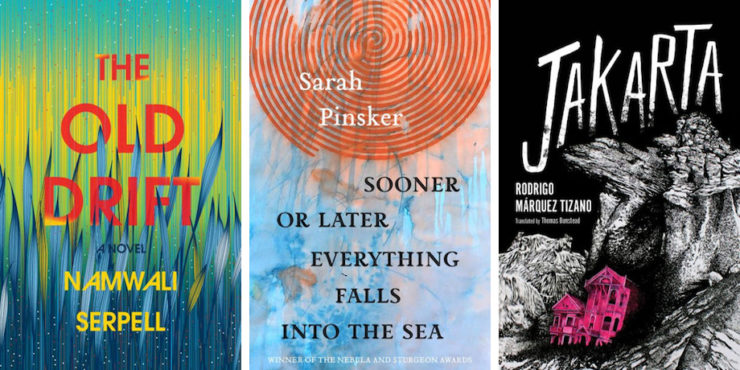
What happens when a novel covering decades of history takes a swerve towards the speculative? That’s one of several narrative surprises to be found in Namwali Serpell’s The Old Drift, which starts off as the story of the disparate branches of a family and turns into a futuristic meditation on landscape, disease, and technology. Sarah Pinsker’s A Song For a New Day also made a foray into an unnervingly plausible near future, exploring a radical shift in how American society might live and experience culture—and what effect that might have on both artists and those who care deeply about art. (Between this and the collection Sooner or Later Everything Falls Into the Sea, Pinsker is having an excellent year.) And then there’s Rodrigo Márquez Tizano’s Jakarta (translated by Thomas Bunstead), which is set in a landscape that’s at once familiar and wholly alien, a fractured mirror of contemporary life spiked with organic technology and abundant body horror. It’s like nothing else you’ll read this year—or any other.
—Tobias Carroll
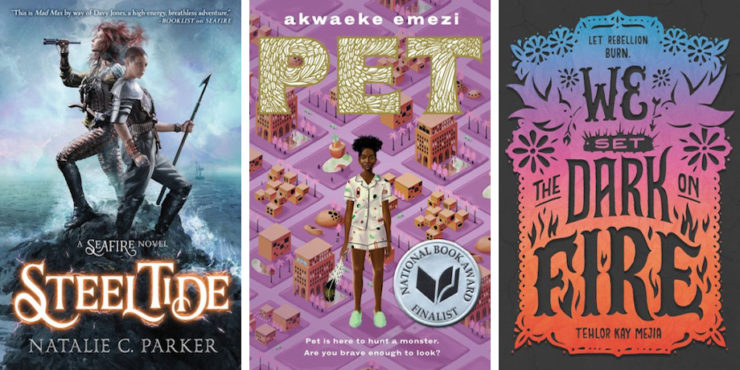
“Just remember that we’re fighting to change the world that forces us to make choices like this.”
Pisces speaks that line to Caledonia in Steel Tide by Natalie C. Parker, but it resonates throughout three of my favorite novels this year. Steel Tide picks up where Seafire left off, a post-apocalyptic piratical girl gang fighting cruel, powerful men. Caledonia is compelled to confront her own morality as she schemes against the encroaching danger of her enemies. Pisces reminds her: we might make vicious choices in the revolution, but without them, nothing will change. We just have to remember our humanity in the process.
In Akwaeke Emezi’s brilliantly rendered Pet, Jam’s world has been cleansed. But once a world is confident the monsters are gone, it forgets that monstrosity is always insidious. Jam, a trans girl with selective mutism, partners with an otherworldly creature to fight a monster no one else wants to believe in. I love how this gutpunch of a novel challenges complacency and deconstructs every binary—including that of angel vs. monster. I love just as deeply the love in this book, the different shapes of families: the love in Pet is intimate and tight-knit, and sprawling, queer, and polyam too. Pet knows how horrifying and familiar monstrosity can be, and that justice must be proactive, ongoing. It will never be easy, but that doesn’t mean we stop.
In the world of Tehlor Kay Mejia’s We Set the Dark on Fire, each powerful man has two wives—a Primera and a Segunda. All Dani wants is to be the best Primera she can be to the most influential young man in Medio. But as she learns more about her world and its systems, she begins to question everything she’s ever known… and starts to fall for her Segunda, Carmen.
Basically, I’m here for speculative stories of badass queer and trans young women fighting systemic inequality, finding love in their community, and doing the messy work of building towards a better world. I’m incredibly grateful that so many books this year are giving me exactly that.
—Maya Gittelman
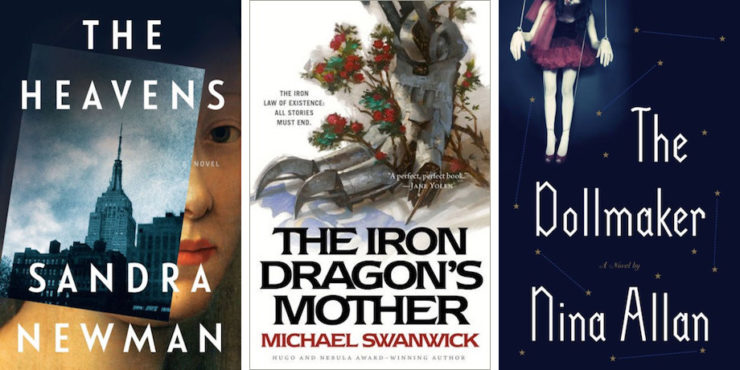
Sandra Newman’s The Heavens remains the year’s standout title for me. In the months since I reviewed it, I’ve recommended it to friends, family, colleagues, dates, booksellers, and any number of random internet people. Its paperback release is around the corner, so hopefully many more people will treat themselves to it. The Iron Dragon’s Mother by Michael Swanwick was another highlight. In my review, I called it “one of the best fantasies of the year.” I stand by that evaluation. Nina Allan’s The Dollmaker was another favorite; it’s a beautiful novel that has sent me scrambling for her backlist.
One welcome development of 2019 was the long-awaited return to print of R. A. Lafferty. I wrote about The Best of R. A. Lafferty elsewhere. I didn’t get a chance to write about his novel Past Master, about a resurrected St. Thomas More on a utopian planet, but I was thrilled to see it return to shelves courtesy of the Library of America.
I suspect Marlon James’s Black Leopard, Red Wolf, Jeff VanderMeer’s Dead Astronauts, and Christopher Priest’s Episodes would vie for a place on this list if only I’d had the time to read them.
—Mathew Keeley
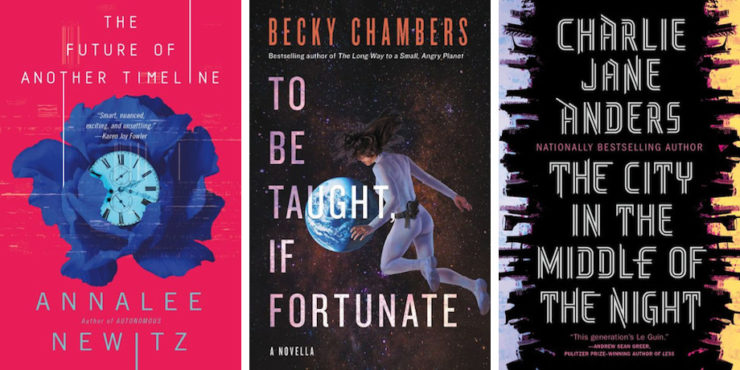
The thread that runs between the “best” books for me, this year, seems to be a marriage of stunning prose with a political or thematic project that I find compelling and relevant to the current moment. The Future of Another Timeline by Annalee Newitz and To Be Taught, if Fortunate by Becky Chambers are both breath-taking books that have earned a place in the long historical tradition of intensely feminist science fiction, for me. Each is invested in questions of social progress, oppression, science, and ethical engagement to the world (as well as other people); each offers equal measures of philosophy and intimacy, kindness and grit, realism and wondrousness. The vast scope of these books—in time, in space—does not lose the human nature of their characters in relation to one another, either.
Two other books mentioned in my first-half-of-the-year roundup still count for the year as a whole too: Magic for Liars by Sarah Gailey and The City in the Middle of the Night by Charlie Jane Anders. And I’d also like to give a nod to the Hexarchate series by Yoon Ha Lee. The collected Hexarchate Stories came out this year, which prompted me to finish the series, and I can’t overstate how brilliant and queer and dangerous and sensually horrifying the whole endeavor is. The trilogy of novels wrapped up well last year, but the novella in the collected stories opens up a whole new potential vista for more work in that universe. I’d be delighted to see more, for sure.”
—Lee Mandelo
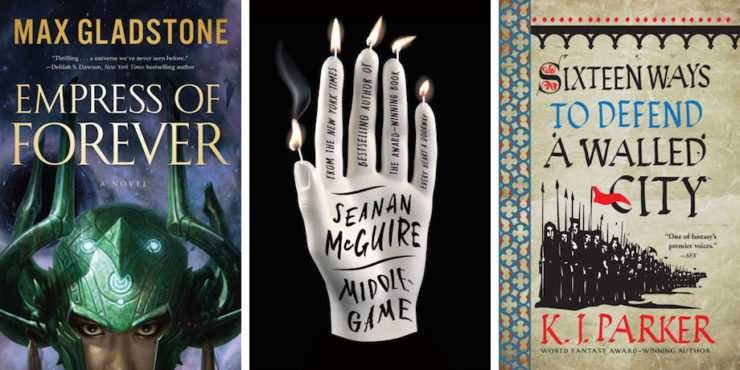
I didn’t read a ton of new fiction this year, mainly because I’ve been on a rereading kick (I was delighted to discover that The Library at Mount Char, one of my entries on this list a few years back, is even better than I remembered), and partly because, you know, what with the state of the world and all, I’ve been digging more into non-fiction. In addition, some of my most anticipated releases were, well, really not bad at all but just not as stunningly brilliant as I expected: The Testaments by Margaret Atwood and Fall, or Dodge in Hell by Neal Stephenson—both fine novels that simply didn’t live up to my probably unfairly high expectations. Still, here are a few titles I really loved:
Empress of Forever by Max Gladstone. In my opinion, Max Gladstone can simply do no wrong. Just based on his Craft Sequence, I consider him easily one of the finest writers to appear on the scene in the past decade or so—and now he’s flexing his muscles in other genres. Empress of Forever is a wild, hallucinatory ride of a novel that manages to be both perfectly entertaining and incredibly innovative, even subversive, in the way it deals with some science fictional tropes. It has some of the most gorgeous, lyrical prose you’ll find in the genre. There are things in this novel I’d never encountered in a lifetime of reading SF, most memorably a character who is basically sentient gray goo with the personality of a teenager. I think that, if the great Iain M. Banks were still with us, he would have loved Empress of Forever. (Note: I haven’t yet had the chance to read This Is How You Lose the Time War, which Gladstone co-wrote with Amal El-Mohtar, but it looks like a few of my colleagues included it on their lists, so… to the top of the TBR stack it goes!)
Middlegame by Seanan McGuire. I don’t read a whole lot of this author’s work, but the excerpt of this novel here on Tor.com was so intriguing that I couldn’t say no. Like The Library at Mount Char, it’s one of those novels that’s hard to describe because it’s so unique, so I’m not going to try and instead just send you to the excerpt.
Sixteen Ways to Defend a Walled City by K.J. Parker. Parker’s ongoing series of stories and novels, set in a sort of alternate version of the period during which the Roman Empire split into the Eastern and Western Roman Empires, is never less than entertaining and often simply brilliant. (Sharps, for example, is another title I featured in one of these posts in the past.) Sixteen Ways to Defend a Walled City is one of the better novels in this set to appear in the past few years. It has some similarities to his previous novel Savages, but that one was (in my opinion) a rare dud for this author, and Sixteen Ways is Parker firing on all cylinders.
—Stefan Raets
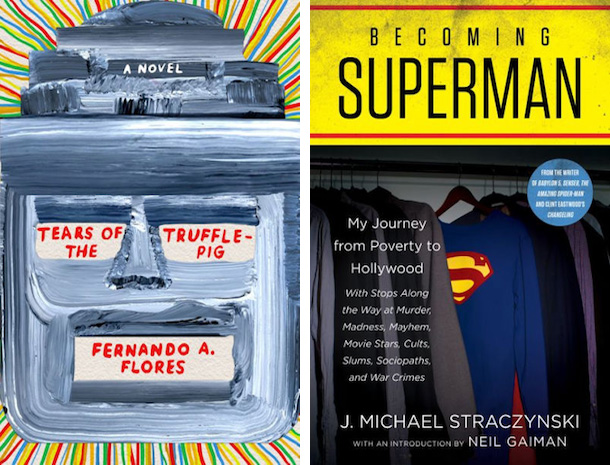
2019 saw me finally catching up on a classic! I read The Night Circus at long last, and absolutely loved it. Erin Morgenstern captures the thrill of falling in love with a work of art better than anything I’ve read in a long time, as over and over again she shows us the Le Cirque des Rêves through it audience’s eyes. Where I was expecting a star-cross’t love story, I got a book about the power of. art, theater, and fandom, and it turned out to be an even better read that I’d hoped.
As for new books, I think my two favorites this year could not be more different—which is always fun. Tears of the Trufflepig is a hallucinatory tale of lost love, genetic malpractice, and life on a tense border, as machine-dealer-turned-amateur-detective Ernesto Bellacosa tries to track down a mob that resurrects extinct animals through cutting-edge science (only to serve the poor suckers up in underground, highly illegal feasts) while evading the prejudices and racism of society along a near-future Texas/Mexico border. Becoming Superman, J. Michael Straczynski’s memoir, tells a horrific true story of abuse and poverty—but JMS spikes his narrative with such insightful writing advice and overflowing love for his craft that the entire book is infused with hope from beginning to end. I can’t think of a more inspiring book for a writer who’s starting out.
—Leah Schnellbach
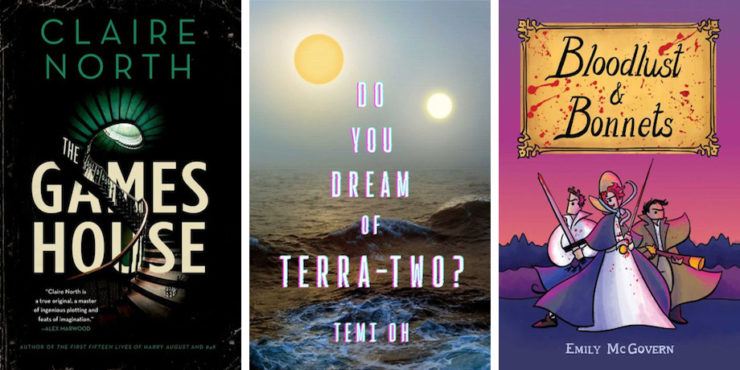
Best 2019 book(s): I read both in the early part of this year, and included them as my ‘mid-year’ picks. Hooray for consistency! Claire North’s The Gameshouse and Temi Oh’s Do You Dream of Terra-Two? use fantasy (the former) and science fiction (the latter) to talk about humanity, history, the future, and, most importantly, people. These are both books about dreams—little and big—and how they define us. And they’re both as enjoyable as they are thought-provoking. Two spectacular books.
Best 2019 book-that’s-not-all-words: Easily Emily McGovern’s Bloodlust and Bonnets, which is adorable, hilarious and very, very gooey. It includes my new patronus—Napoleon the Eagle—and a laugh-out-loud portrayal of Lord Byron (you know, from books).
Best book read in 2019: Joan Aiken’s The Serial Garden. A collection of stories about the Armitage family, who wished for adventures to happen on Monday (but not every Monday, because then it wouldn’t feel special). Aiken’s stories are wistful and lovely; heart-warming pastoral fantasy that’s never twee. Perfect for all ages.
—Jared Shurin
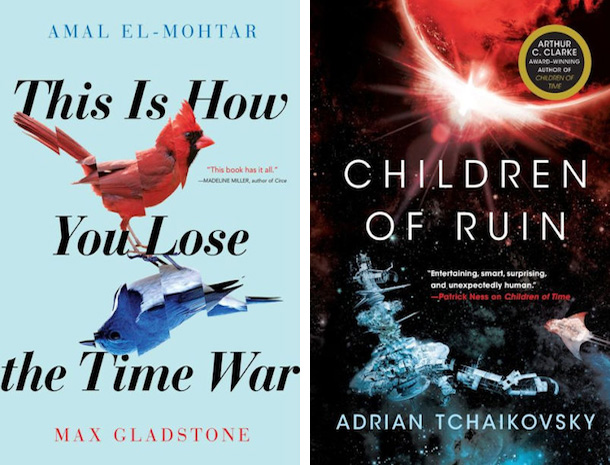
Amal El-Mohtar and Max Gladstone’s This Is How You Lose the Time War is a time travel story, an epistolary novella, a love story, an exploration of reference and poetry and heartbreakingly excellent crafted language. It burns and radiates with power as it tells the story of two opposite numbers in a conflict who find in each more in common than with their peers. It contains some of the most beautiful writing I’ve ever encountered, in or out of SF.
Part of the heart of the genre is Space Opera. And there has been some very good space opera published this year. I think for me, narrowly, the best of the 2019 Space Opera is Adrian Tchaikovsky’s Children of Ruin, follow up to his award winning Children of Time. Although not 100% as good as that amazing novel, 95% as good as one of the best Space Opera novels ever written makes it the best Space Opera novel of the year. Intelligent spiders, octopi, humans, secrets, lies, braided stories in two time periods is a high wire act that the author manages with consummate skill. Going on an adventure indeed.
—Paul Weimer
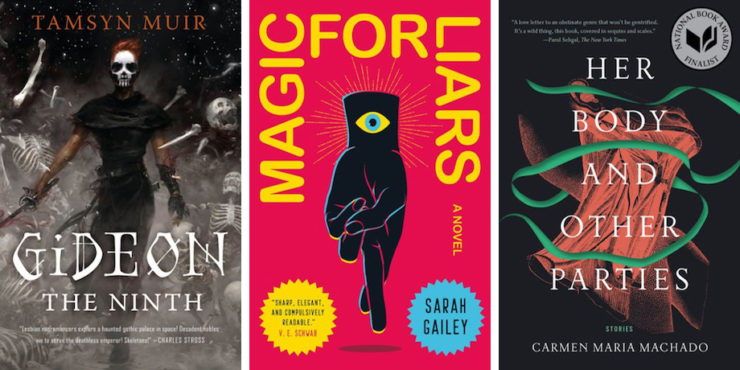
I wouldn’t have worked at Tor.com if I didn’t care about the books I helped promote, but this past year was one whose output were genuinely among my very favorites—in part because of how they surprised me as a reader. Gideon the Ninth is the book and the fandom I never suspected I’d have a place within, with its skeletons and haunted castles and prevailing atmosphere of death magic and other gloominess, but I have become ride or die for every single necromancer/cavalier duo in the Emperor’s nine Houses. And while I have struggled to find an urban fantasy that didn’t feel cheesy, Sarah Gailey’s Magic for Liars hit that perfect Venn diagram I didn’t know existed: clued-in to contemporary job burnout, dating mores, and self-esteem struggles… but with an extra layer of magic to amplify those relatable conflicts. But I have to echo Marty in saying that this year’s top debut for me was Arkady Martine’s A Memory Called Empire: a space opera future that’s sharp and lush, with some of my favorite worldbuilding via imagos, and proof that no matter how far humanity goes, we will remain tremendously geeky.
The flip side of working in publishing is the slow burn of hearing about a book for over a year but not being able to get your hands on it. I’ve been reporting on Max Gladstone and Amal El-Mohtar’s This Is How You Lose the Time War since their first giddy tweets about it, and I wanted nothing more than to time travel to its release date. Waiting in real time made getting to read it all the sweeter; Red and Blue’s correspondences, from the words on the page to the increasingly ingenious ways in which these rogue time agents leave each other love letters, is a marvel of language and collaboration.
Carmen Maria Machado’s Her Body and Other Parties I’ve been slowly reading here and there based on particular stories: “The Husband Stitch” when the collection was first announced and that installment got so much (rightful) buzz; “The Resident” when I wanted to spook myself during my four-week writing residency in Nebraska City; and so forth. But it was a random afternoon where I turned to “Inventory” that really cemented Machado’s work for me. A list of sexual partners and self-discovery that turns increasingly dire and builds its world around these intimate data points? Brilliant.
—Natalie Zutter










